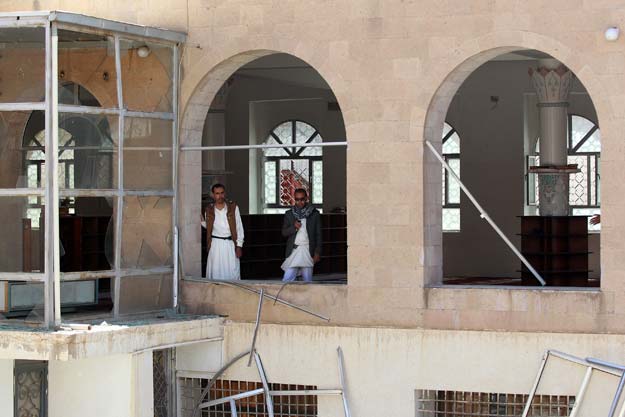
The Huthis, whose militiamen seized Sanaa in September, vowed to take further "revolutionary steps" following Friday's blasts.
The Islamic State (IS) claimed responsibility for the attacks on two mosques in the capital Sanaa and another in the Huthi's northern stronghold of Saada.
They were the first claimed by IS in Yemen, where rival al Qaeda has traditionally been the dominant organisation.
President Abedrabbo Mansour Hadi has taken refuge in the southern city of Aden having escaped house arrest in the Huthi-controlled capital last month.
In a letter to relatives of the victims of the mosque bombings, which also left 351 people wounded, he condemned the attacks as "terrorist, criminal and cowardly".
"Such heinous attacks could only be done by the enemies of life," who want to drag Yemen into "chaos, violence and internal fighting," said the letter released by his office late Friday.
"Shia extremism, represented by the armed Huthi militia, and Sunni extremism, represented by al Qaeda, are two sides of the same coin, who do not wish good and stability for Yemen and its people," Hadi wrote.
Hadi has declared Aden the temporary capital of Yemen.
The attacks came a day after clashes between forces loyal to Hadi and those allied with the Huthis in the southern city.
There were signs that security forces allied with the Huthis and former president Ali Abdullah Saleh were planning to seize Taez -- a strategic city between the capital and Aden.
Since taking over Sanaa the Huthis have tightened their grip on government institutions, aided by forces loyal to former strongman Saleh.
In their push to widen their control to the south, they have faced fierce resistance by Sunni tribes allied with al Qaeda militants who are active in the impoverished country.
Al Qaeda swiftly distanced itself from Friday's bombings, insisting it does not target mosques.
In an online statement claiming responsibility, the Sanaa branch of IS said the attacks were "just the tip of the iceberg".
Mohammed Abdulsalam, the spokesman of the Huthi's Ansarullah party, said the bombings were part of a "clear war against the Yemeni people and its popular revolution" -- the term used by Huthis to refer to their takeover of the capital.
He accused "Gulf-funded media" of providing political cover for Al-Qaeda elements in the provinces of Baida and Marib by describing them as tribal fighters opposing the Huthis.
"It is now imperative that we complete the revolutionary steps to protect the people and their revolution," he said in a statement.
The Huthi threat came as reinforcements from the Special Forces, accused of links to the Huthis and Saleh, were sent to Taez, 260 kilometres south of Sanaa.
Military sources said about 1,200 soldiers, backed by 22 armoured vehicles, had arrived in the base of the Special Forces in Taez.
Hundreds demonstrated Saturday outside the base, saying that the reinforcements included Huthi fighters and demanding their return to Sanaa.
Taez is only 180 kilometres north of Aden, and is seen as a strategic entry point to Hadi's refuge.
"The bombings in Sanaa will now be taken as an excuse to open new fronts by attacking Taez and Marib (in the east)," said Yemeni youth activist Bassem al Hakimi.
He said the two "steadfast fronts" would be attacked under the pretext of fighting extremists.
The mosque blasts sparked an international outcry.
Saudi Arabia, a strong backer of Hadi, denounced the "terrorist attacks" and offered to transport victims to its hospitals for treatment.
Iran, which is accused of backing the Huthis, "strongly condemned" the bombings.
French Foreign Minister Laurent Fabius described the blasts as an "absolute catastrophe," adding that Yemen is "one of those countries where the crisis worsens by day".





1732687571-0/Untitled-design-(2)1732687571-0-270x192.webp)






1732617223-0/Untitled-design-(69)1732617223-0-270x192.webp)










COMMENTS
Comments are moderated and generally will be posted if they are on-topic and not abusive.
For more information, please see our Comments FAQ